When the Pilgrims were planning the first day of thanks in 1621, they looked around and, though their numbers had been cut by more than half since their arrival, they still had 50 mouths to feed, not to mention the dozens of members of the Wampanoag confederation who were likely to arrive as guests.
They needed a lot of turkey. But this land’s first European settlers were nothing if not inventive, and so that first Thanksgiving was also the first American holiday celebrated with what has become a tradition: the potluck. The colonists brought the turkey, and their guests contributed the venison. And ever since, part of the excitement of the holiday has been seeing what Aunt Marge is going to bring in the category of “vegetable.”
Following their example, we decided to share the burden for our Thanksgiving feast, as well. We set a table for eight and invited our contributing writers to participate, doling out assignments for cranberries and pumpkin pie left and right. The only rule: They had to mention the name of their assigned dish once in the piece. Other than that, they were on their own. So pull up a chair and dig in. And watch out for those dinner rolls. They’re…well, you’ll see.
Timmy’s Song
by David Leite
When we walked into Miss Jensen’s ninth-grade music class, the chairs were set up in a semi-circle, which meant there would be no clapping out three-quarter time that day. She stood against the green blackboard with its rows of staves, their paint chipped, looking like long lines of Morse code tapped out with cocaine. Above, the clock, speckled with spitballs, was broken. Both hands, having given up, hung down, pointing to her head.
“Today, class, we have a special artist.” No long introduction, no flirtatious rubbing of shoulders. Just: “Today, class, we have a special artist.” She backed into the corner, leading with her hand, as if frightened of taking her eyes off of us, until she found a chair. After a long pause, the door opened. It was Timmy Martin holding a guitar case. Today was his first day back at school; he’d been gone for almost a month. Bobby Hazlett looked at me. It was the first time I’d remember seeing anything close to compassion on his pus-pocked face. Tracy Medeiros worried her mood ring. Lucy Lima began whimpering.
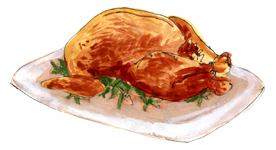
Timmy came in and kept his eyes on the floor. Everyone thought it was because of what happened, but I knew that was just how Timmy walked: He pressed into walls going down the halls. He bled into the bleachers in gym. He wanted to be invisible. He took out his guitar and ducked under the strap. Still looking at the floor, he said: “The day before Thanksgiving, my father was shot in the head in New Orleans by a mugger. This is for him.” From behind me I heard Orin Bolton whisper, “Well, I guess that meant no turkey for him.” I hated Orin for years for that, until one morning my mother called me at work to tell me he had been stabbed to death in a drug deal outside D’Angelo’s grinder shop on South Main Street.
Timmy took a moment, twisting his left hand until his fingers wrapped around the opening chord. “I left a good job in the city,” he started, “working for the man every night and day.” He couldn’t sing. His voice was expressionless and atonal. Maybe it’s the Valium they gave him, I remember thinking. There was none of the frantic, hepped-up energy Tina Turner brought to the song. It sounded like a dirge, as if he were purposely slowing down the song, searching it for clues to his father’s murder. I don’t know why he chose that song; his father was a Sinatra man. Maybe the New Orleans reference? Maybe it held some personal message? When he finished, no one applauded, and it didn’t look like he needed us to.
Krik’onto
by Matthew Baldwin
In the Early Days, the wisest of the Peoples was humble Krik’onto. Krik’onto spent his days pondering the riddles of life, as deep in thought as he was in the earth.
“Why am I here?” he would ask upon waking, as the rising sun warmed the soil around him. He would spend the morning disentangling the two questions inherent in the one: In the larger sense, “Why am I here in this world?” and, in the smaller, “Why am I here underground?” He would then set out to resolve each in turn.
The first was the easier of the two: Krik’onto existed, as did all Peoples, because Krik had created him. From this the second answer flowed naturally: Krik, recognizing that Krik’onto was of a philosophical bent, had hidden him under the floor of the world, away from the light and din of the surface, to allow him to spend his days in peaceful contemplation.
Krik’onto would typically come to this latter conclusion shortly after sunset. Satisfied, he would drift off to sleep, and awaken the next day to reconsider the question with fresh eyes.
The Early Days came to a close when Krik took his leave of the world. His final act was to give each of the Peoples their own name, to show that they were no longer in His service.
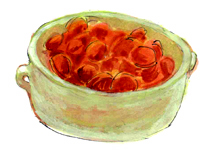
When He came to Krik’onto, Krik laughed fondly. “In recognition of your eternal pursuit of truth,” He said, “you shall henceforth be known as ‘why am.’”
Krik’onto thanked the Creator and wished him well on his journey. But he secretly hoped Krik would depart quickly. Krik’onto had enigmas yet to master, and the sun was already low in the sky.
My Inner Lionness
by Lauren Frey
“I eat anything but tripe. You?” I ask.
“I’m vegan,” he responds.
Uh-fucking-oh. At this point I should have walked away and saved myself the two-month relationship that followed. Two months during which my food was lucky to be dead, because he continually threw it nasty looks that would have deeply offended anything sentient.
I see his point: My food was sentient until it was killed in a factory, then boiled in my kitchen. But when you come across a lion hunting on TV, you don’t think, “That lion’s an asshole.” You think, “That lion was hungry.” Humans, similarly, are omnivores.
That said, I do feel like an asshole sometimes. Even though I get weak and pale when I cut meat from my diet, even though I know fundamentally I would be able to kill a chicken if I’d grown up in a time when that was a necessity. In fact, my family did keep goats for milk and chickens for meat when I was a kid. Still, fundamentally, I wish I didn’t need the stuff.
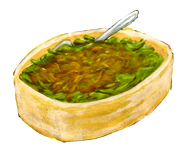
But when I look at a good menu, or when Thanksgiving rolls around, I almost invariably think, “This is why it would suck to be vegan.” Because seriously, you couldn’t even eat the green-bean casserole. My mom makes hers with organic milk, and it’s totally delicious.
Barbara’s New Year
by Tobias Seamon
The funeral had been a month earlier and the ashes already scattered by the family, but we wanted to hold our own memorial for Frank. It’d been a decade since we were all together at Jon and Natasha’s wedding, and they hosted the belated wake as well. Though it was only September, the hill country was cold and raw, and we slowly warmed ourselves with bourbon in the library with its views of the woods. I’d brought Frank’s favorite movie, The Last Waltz concert by the Band, and I was telling everyone about the last time I saw Frank. He was home with hospice nurses in and out, but he was cheerful enough with his IV drugs and a “Fuck Bush” sticker glued to the pocket of his bathrobe. He was watching The Last Waltz on video, and waving toward the guys on stage with their funky hats, Delta suits, and yodeling choruses, he nodded, “That form of cool doesn’t exist anymore.” Of course I knew what he was really saying was, I won’t exist anymore either, and things in the library got quiet for a minute.
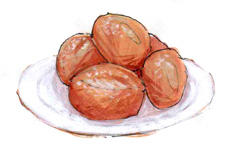
That’s when Barbara burst through the door with a motorcycle helmet in her hand and said, “There’s dinner rolls all over the road. Can someone help me get them?”
She was late, but Barbara was always late. Her cheeks were red, her graying curls whipped into a froth, and she was gorgeous like always, too. I’d slept with Barbara on and off for years, and Jon even had a fling with her just before Natasha, but that one she wasn’t proud of.
She threw the helmet onto a couch. “This weather, shit. I had the Tupperware strapped down but that last turn, the bungee snapped or something. I can’t believe it, I mean Jan brought that stuff back from Amsterdam. Crazy bastard, I wish he’d just move in with the bitch, this musical beds shit is getting old. Natasha, I’m sooo sorry. I know I said I’d help with lunch, but damn, you look good. Hi, Mike; hi, Jon; hi, Tom; and whoever’s skulking behind the sculpture thing-y. Oh, that’s the cat and Ellen. Where’s Carol? I found some old papers we did for Professor Wilson that she’ll really get a kick out of. Look, could somebody get off their ass and help? Jan snuck that stuff in and I spent all morning baking and these things are fantastic, though they’re kind of puffy like muffins. Blond Lebanese, people, not our mothers’ hash. God, I miss Frank. Is that bourbon or Scotch? Aw, I don’t care, did I ever care?”
As always, Barbara gave us a lost cause to rally around, and soon we were laughing like fools on a prankster Easter hunt as we groped among the roadside weeds.
“There’s dinner rolls all over the road. Can someone help me get them?”“Tom, you stopped calling,” Barbara shivered on my elbow. “You saw Frank at the end. I never made it, but you know that. Things are so bad, they’re so bad everywhere. I needed to see you, but I didn’t know what you’re doing or who you’re doing it with. Jon had just called about Frank’s funeral, but you should have fucking called me, too. Why don’t people ever call?” she said, spinning me around by the shoulder.
I got mired in her glazed eyes and the gravelly road through the forest, and her lips were a lot warmer than I remembered. That was when Barbara gripped my corduroy jacket and announced, “Hey, you heathens know this is Rosh Hashanah? Happy New Year! You know I love anything new.” Then she pressed her face into my chest and said, “I love anything, Tom.”
Jon hoped to find a ram’s horn amidst all his bric-a-brac but no go, so we welcomed the New Year with Van Morrison on The Last Waltz, remembering Frank’s cool in the way that Morrison staggered offstage as he always did back then, lost in the wings while his song still played.
St. Mary-of-the-Lettuce
by Jessica Francis Kane
“Can I do anything to help?” It was one of those questions you ask because you have to. I was a guest in the house; my friend, Matt, was getting married. His aunt was arriving with groceries.
“Yes,” she said. “Help me wash lettuce.”
We stood by the sink, the window decorated with small vintage evening purses, little sequined clam bellies, glinting in the sun. A fantastic touch, purses in the kitchen. The work of the bride.
I don’t know how she did it, the lettuce kept appearing, head after head after head.
Aunt Mary talked fast, washed lettuce faster. I struggled with the spinner, one that seemed to defy the laws of physics. A gentle push and you got 90 miles an hour. I couldn’t stop it, and as the mound of Aunt Mary’s washed lettuce was growing exponentially, I couldn’t wait for it to lose momentum, either. I slipped open the top, jammed in my thumb, shook out the lettuce, started again. Aunt Mary chatted about Christ, death, social justice. She did most of the talking, while my thumb grew red and sore; I’m not good in the kitchen—its demands for intimate conversation mixed with manual labor are too much for me. Aunt Mary wondered if Matt and his bride would become Catholic. I thought they already were, but she seemed worried about their lack of faith.
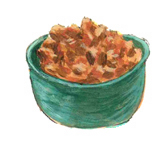
“That side of stuffing,” Aunt Mary said.
“Oh, you know,” I laughed. “He’s better than that. I’d say his faith is like a side, plus a drink and a dessert.”
When Aunt Mary didn’t answer, I looked up. She was frowning. Then she pointed to a small bowl on the counter near me, a small bowl of what appeared to be stuffing.
“Could you hand it to me? I was going to put it in the refrigerator.”
After that, Aunt Mary didn’t talk much. I eyed the grocery bags. There were only a few, but somehow, I don’t know how she did it, the lettuce kept appearing, head after head after head.
A German Thanksgiving
by Meave Gallagher
In 2004 I spent my first Thanksgiving without my family, in the company of the Germans with whom I would live for the next year. I was their fifth au pair, and they were well versed in a typical American Thanksgiving. “We like to have a Thanksgiving,” they told me, “so you feel more at home.”
In my family, Thanksgiving hasn’t involved an entire turkey in years, not since my brother and I stopped eating meat and my parents realized they don’t really care to have a freezer full of turkey parts through April. For my Germans, though, it was the most glorious of novelties. On the Tuesday prior, we loaded the kids into the Mercedes station wagon and headed out to the Wal-Mart—the only place in town to buy a bird of the appropriate size. We picked up the biggest frozen American turkey they had, joking about how it weighed more than the baby. Then they asked me if there was a dish I especially wanted to have for the meal.
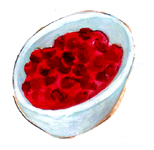
As an owner of Thanksgiving (i.e., an American), I’ve had the privilege to create my own tradition. My parents work out early in the morning that day; my brother and I spend the entire day in pajamas. Menu items include plain yams, pumpkin custard, but no stuffing. My erstwhile hippie parents were never fans of foodstuffs cooked inside an animal; instead, we have my mother’s dressing: cubes of homemade bread mixed with orange juice, raisins and roughly chopped cranberries. The bitterness of the berries—some pieces tiny, some nearly whole—contrasts beautifully with the sweetness of the raisins and the tang of orange juice, and it’s the true taste of the holiday, to me.
My Germans didn’t know what I was talking about. “You mean, that red stuff that viggles?” they asked me, confused. I sighed and made room in the cart for the package of bacon that we would eventually mix with the package of breadcrumbs and push into the turkey.
Priceless
by Rosecrans Baldwin
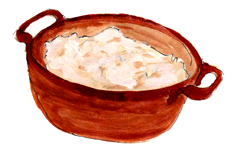
My cholesterol problems are on the public record. However, mashed potatoes should kill you first, pussyfoot second. I like mine in large portions. If there are any leftovers, you can turn them into sloppy latkes for breakfast. Sometimes I’ll throw in a little white truffle oil, or bacon, or rosemary and fried sausages and reduced apple cider, or fried shallots and thyme and roasted garlic (with garlic butter to really junk the trunk), or duck fat and buttermilk and lemon zest, or chopped ham, or leftover pulled pork. But Thanksgiving is about doing the most with the least. Hence, I’ve limited myself to heavy cream, a stick of unsalted butter (have another on hand just in case), nutmeg, salt, pepper, and two large Yukon Golds per person.
1. Set out the butter and cream. Scrub the potatoes if you think that will make a significant difference in the amount of disease and filth you breathe in on a daily basis. Peel them and don’t cut off the tip of your left index finger, like I always do. Boil them in a stockpot of salted water until a fork can puncture one easily, about half an hour.
I use an actual potato masher I bought for six bucks. It looks like a cattle brand for Sudoku ranchers.
2. Drain the pot and find a masher. I use an actual potato masher I bought for six bucks. It looks like a cattle brand for Sudoku ranchers. Whatever you use, break those potatoes down, baby, but not too down; you want some chunks, pebble-sized.
3. Now begins the alchemy. Add the butter one inch at a time and whip the crap out of it with a wooden spoon—”it” being the whole potload. And I really mean whip. Your forearms should clench up and burn. Two of my wooden spoons are warped from too much mashed-potato whipping. You may want to take the pot off the stove and clench it between your knees for better torque, though beware of second-degree burns. I used to do this, but I’ve stopped because I prefer to keep a low flame running under the pot while I mix. Do what feels right. You want to be in the zone, where your mantra is: add some butter until things look greasy, then add some cream, season, whip for ten seconds, then taste. The idea is you’re slowly adding enough butter and cream, with dashes of nutmeg, salt, and pepper, until your whipping coats the pot walls with what looks like vanilla frosting, and tastes even better. Did I mention the nutmeg should be fresh and the pepper should be ground? Another point: you’ll be surprised by how much salt you need, but don’t hold back.
Double-Stuffed
by Sarah Hepola
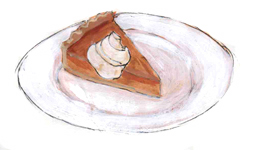
My mother, who wore no makeup and grew her black hair to her navel, was an early adopter of the natural-foods movement. This makes her pretty cool, I think; it also made Thanksgiving suck. I just wanted what was rightfully mine—a plate of Hostess cupcakes dipped in hot fudge and topped with meringue. Instead, my mother made pumpkin pie. I preferred the sweets I snuck from the dark, high shelves of the kitchen cabinet—an old tube of frosting, a handful of clumpy brown sugar—but in a pinch, pumpkin pie will do.
The pie was a concession to her two children, who shared her zeal, but not for brewer’s yeast. My older brother and I jonesed bad for processed foods. In the grocery store, we stared at Wonder Bread and Cocoa Puffs like street urchins, one sweet tear rolling down a ruddy cheek. My mother would have no sooner bought us Double-Stuf Oreos than cigarettes. But for pity’s sake, we could have pumpkin pie on Thanksgiving.
This year, for the first time since they were married, my parents are celebrating Thanksgiving without either child. My brother is deployed overseas. I’ll be in New York, at a decadent dinner party where I could probably bury myself underneath fudge brownies. The funny thing is, I’m not much of a sweets person any more. I could take or leave it. Anyway, the point is that with only two people at the table, Mom is skipping the pumpkin pie. Which is fine by her. These days, she’s a total chocoholic.


